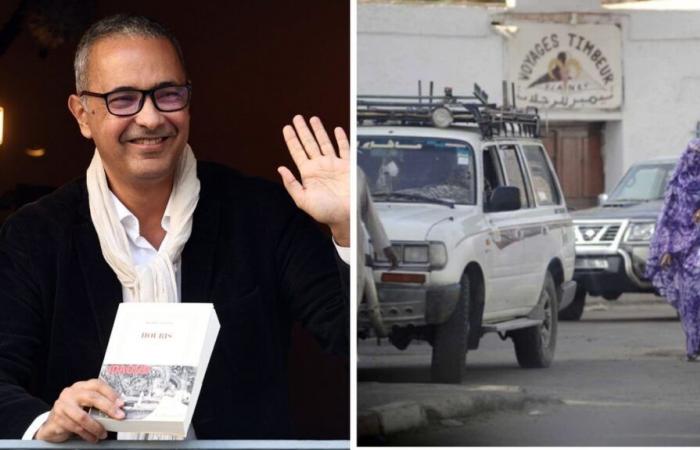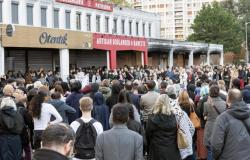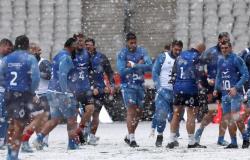Kamel Daoud Monday after the announcement of the winner of the Prix Goncourt. On the right, the town of Djanet in Algeria.image: keystone-archives
The Goncourt Kamel Daoud Prize is banned from the Algiers Book Fair. There is total silence around the murder of a Swiss woman in October in Algeria. The leaden pall that falls on these two events perhaps has one thing in common: a law relating to the terrible Algerian civil war of the 1990s.
05.11.2024, 18:5405.11.2024, 22:32
Follow me
The Algiers International Book Fair opens Wednesday, November 6, but there is one big absentee: Houris. The novel by Kamel Daoud, the child of the country, crowned Prix Goncourt on Monday in Paris, is not welcome there. The reason? Since 2005, the Charter for Peace and National Reconciliation has prohibited anyone from using or instrumentalizing “the wounds of the national tragedy”. Reference is made here to the “black decade”, the civil war which bloodied Algeria from 1992 to 2002, causing between 100,000 and 200,000 deaths.
With Hourisa title which uses the jihadist terminology designating the virgins of paradise promised to martyrs, the writer Kamel Daoud, journalist in Algeria during this same dark decade, now based in France, broke the law of silence applying to these terrible years. The heroine of his novel is a young woman who lost the use of speech after a man tried to slit her throat in the name of God. Result of this state censorship: copies of the book are apparently circulating in large numbers undercover in Algeria.
Is the deafening silence of the Algerian authorities since the assassination of a 57-year-old Swiss tourist on October 11 in Djanet, in southern Algeria, part of the same memorial blackout? Beyond the fear of image damage for tourist activity in a Saharan region long closed to foreign tourists for security reasons, the complete absence of official communication on the subject of this drama perhaps has a link with the motivations that fueled it.
We had to wait until October 22 for the information to come out, via the French daily Liberation. But it is Le Figarowho on the same day provided details of the attack. According to our colleague, “the victim was sitting on the terrace of a café when a man threw himself at her and slit her throat with a bladed weapon while shouting ‘Allah Akbar’.” Two suspects, one of whom is believed to be the murderer, were arrested.
Other versions, dismissing the apparent Islamist trail, point to a nefarious motive, in this case, the theft of the victim’s cell phone. Originally from Klosters in Graubünden, the murdered Swiss woman was on vacation in Djanet with her daughter, her friend and two other Swiss tourists. All of them, as well as the body of the deceased, were repatriated to Switzerland. According to witnesses cited elsewhere, the suspects were individuals from northern Algeria who dressed in the style of the Tuaregs.
A great silence
In this case, the authorities authorized to speak remain silent on the reasons and circumstances of the tragedy. The Klosters town hall does not want to comment. In Bern, the Federal Department of Foreign Affairs (FDFA), with extreme caution, invokes “the protection of the personality of the victim” for not responding. As people respond that they do not understand the relationship between the circumstances of the death of the Swiss tourist and the protection of the latter’s personality, the FDFA refers it to the Algerian authorities, who say nothing.
The French-speaking Algerian press seems just as silent: nothing – but perhaps we missed a related mention – on the assassination of the Swiss woman in Djanet. Instead, articles reporting the return of foreign tourists in numbers and the efforts made to welcome them.
From these combined silences emerges an impression of omerta. Does Bern intend to spare Algiers by refraining from publicly addressing requests for clarification on the course of this assassination? Does he want to leave it to his Algerian partner to communicate about the tragedy, which the latter obviously does not want to do?
As for Algeria, the fear of bad publicity for tourism, a sector so profitable for Morocco and on which it in turn seems to be banking, can explain its silence. But the potentially terrorist nature of the facts accentuates the enigmatic side of this silence.
“It’s the leaden screed”
“In Algeria, there is a heavy burden on security issues,” observes a specialist in Islamist terrorism in the Sahel.
“We cannot say with certainty that the Swiss tourist was the victim of a jihadist-type attack. There is a lack of information that can be verified. But we cannot rule out the possibility either. Note that this assassination occurred a few days before the commemorations of the 70th anniversary of the Algerian insurrection of November 1, 1954. For the Algerian authorities, this could not have come at a worse time.”
A specialist in terrorism in the Sahel
Our interlocutor wonders about the absence of demands linked to this assassination, accompanied by the cry “Allah akbar”, according to Le Figaro. “If this is a terrorist act wanted by its author or authors, we can put forward the hypothesis that Daesh, present in the Sahel, did not wish to claim responsibility, even if in an opportunistic manner as it has done. habit, the murder of a woman.” And the specialist recalled that the assassination of two young Scandinavian hikers, in 2018, in the Moroccan Atlas, by four attackers claiming to be Daesh, had not been claimed by the terrorist organization.
“Daesh, clearly, does not accept the murder of women when it is women who are specifically targeted”
A specialist in terrorism in the Sahel
The silence surrounding the death of the Swiss woman in Algeria can be explained by the desire, notwithstanding the 2005 charter which limits free expression on the subject, not to reopen the wounds of the civil war, which was deeply traumatic for the Algerian people. In doing so, we are perhaps depriving ourselves of purging what remains to be purged in recent memory. The works of the Prix Goncourt published by Gallimard, Houriswho are currently circulating surreptitiously in Algeria, will surely be able to contribute to this office. In particular and if it shows interest, among the younger generation, those who were born after the dark decade.







